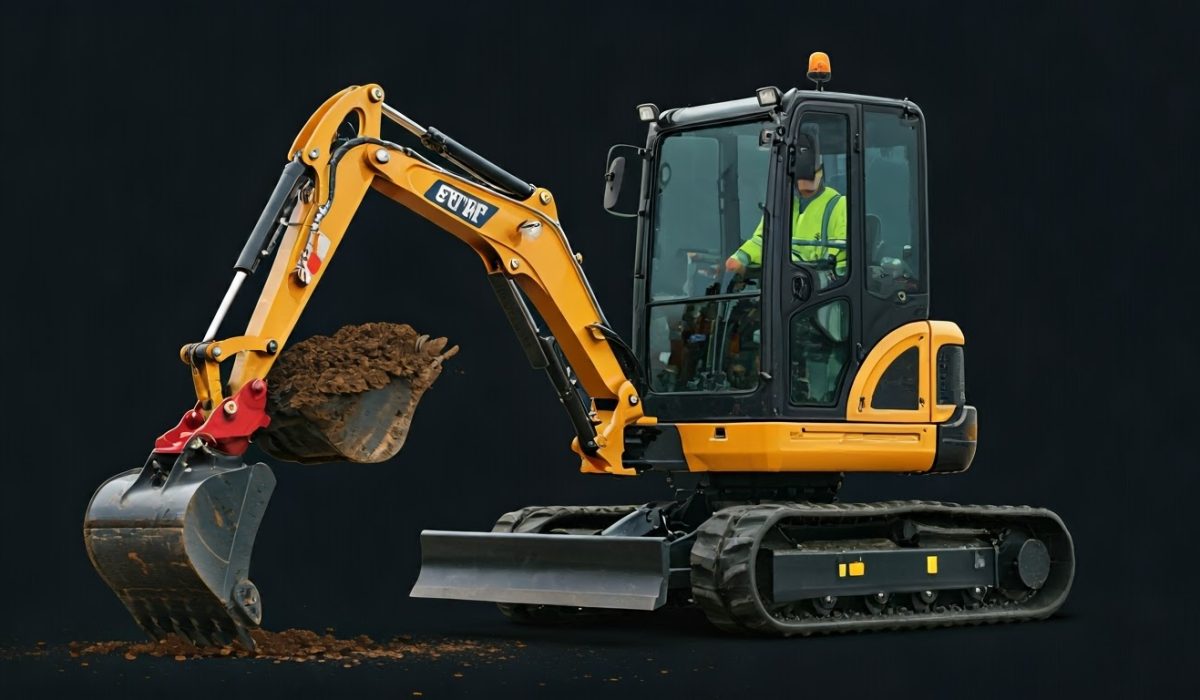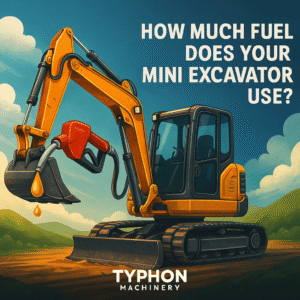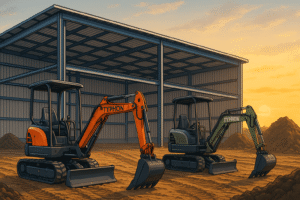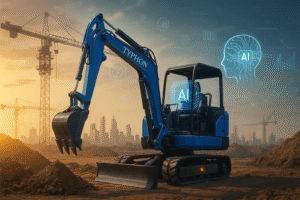Buying Guide for 2025 Mini Excavators. This extensive guide will help you purchase a mini excavator. Mini excavators adapt. They’re used in farming, gardening, and construction. However, buying one is hard. Size, weight, features, and attachments important.
Our objective is to simplify this process. Here are 10 mini excavator buying tips. Manufacturer and brand reputation will be addressed. We’ll recommend warranties and services when purchasing. Cost and finance will be explored. Before purchasing, we will provide a mini excavator inspection checklist.
Operator comfort and safety will be addressed. Environmental issues and emissions requirements will be addressed. We’ll conclude with mini excavator sales and depreciation. With these guidance, you may purchase a compact excavator with confidence. Let’s begin.
Everything About Mini Excavators—Uses of Mini Excavators
Mini excavators offer great versatility. Numerous positions require them since bigger machinery is often unfeasible. Their small size makes them easy to use in limited spaces. This equipment is widely used in the construction industry. Their responsibilities encompass trenching, demolition, and grading. They also cultivate trees and move earth around the landscape.
Mini-excavators are favored by farmers. They observe the fields, create barriers, and shape the landscape. Their ability to navigate challenging landscapes brings significant benefits in countryside settings. Mini-excavators are filled with booms, dipper arms, and buckets. This allows for controlled, precise movements. Depending on the project, attachments may enrich its worth.
Their ability to move freely is yet another benefit. Standard trucks are capable of carrying mini excavators. Companies that require site mobility will find them attractive. Professionals seeking to enhance efficiency will discover that mini excavators are perfect due to their versatility.
Key Mini Excavator Features
Finding the right mini excavator demands knowledge of its key features. This maximizes your investment. Engine power impacts machine capacity.
Depth and reach matter in excavation. These factors define how deep you can dig without shifting equipment. It might severely impact site efficiency and time.
Essential is hydraulic performance as well. For machines, hydraulics provide an exact control and flawless connection. Make sure your decision lets attachments be possible.
Rubber or steel tracks define the mobility and ground protection of small excavators. On soft ground, rubber tracks perform better; on hard ground, steel tracks last longer.
Comfort comes from an enclosed cab with climate control. Operator comfort especially during long runs boosts production and safety. Modifying controls and seats might assist to reduce operator fatigue.
Some key features:
- Engine power
- Depth and reach of excavation – Hydraulic efficiency
- Track type (rubber vs. steel)
- Comfortable enclosed cab
Assess bucket and attachment size last. Different sizes and designs might assist your excavator manage jobs. Understand these factors for a smart buy.
Top 10 Buying Tips of 2025 Mini Excavators:
Favoring Mini Excavators Over Larger Equipment
Compact excavators offer advantages. Small size allows them to function in tight spaces, a big benefit. This is ideal for urban or small construction sites with limited space.
Additionally, mini excavators consume less gas. Less fuel means cheaper running costs for smaller engines. This efficiency attracts companies seeking cost reductions without sacrificing performance.
Still additional advantage is their mobility. Standard trailers fit small excavators. Fast transportation of them between job locations increases production and saves time. Own miniature excavators are cheap. Initial costs are less than those of major equipment. Small mechanical systems of mini excavators minimize repair and maintenance expenses.
Size, weight, and conveyance
A mini excavator’s size counts. Smaller variations are easier to handle in narrow spaces, while larger ones are stronger. Consider your typical job areas while choosing a size. Weight matters. It affects transportability and ground impact. A lightweight device protects delicate landscaping and other surfaces.
Transportability depends on weight and dimensions. Fit your goods to your trailer or automobile. Otherwise, you may need to acquire transport solutions, which may cost more. Think about project transport. Close places or long hauling? Transit times, fuel prices, and efficiency are affected.
Application of Attachments
Mini excavators’ attachments boost their capabilities. They make your machine handy for numerous tasks. The right work connection is crucial.
Most individuals utilize buckets of various sizes and forms. The right bucket is essential for digging, trenching, and grading. Example: heavy-duty rock buckets.
Attachments like augers help. They allow precise planting and drilling. Landscapers and farmers drill various-sized holes using augers.
Perfect for demolition, concrete and stone shatter fast using hydraulic hammers. They could demolish buildings. Hydraulic hammers find use in roadwork and construction.
With grapples, logs and rubbish may be raised safely. With this attachment, control and handling in forestry, recycling, and agriculture are rather outstanding.
Common attachments:
- Buckets
- Augers
- Hydraulic hammers
- Grapples
- Thumbs
Each link grants exceptional abilities. Choose the right ones to increase mini excavator output. Choose project-specific attachments to maximize efficiency and effectiveness.
Comparing New and Used Quality and Condition
Choosing a used or new Mini Excavator calls for several factors. Your decisions should be guided by the budget, project size, and machine condition.
Modern mini excavators include new features and technologies. They need less maintenance early, giving peace of mind. New machine warranties cover unexpected issues.
Using min excavators may save money. Carefully assess their condition. Preventing costly damages demands meticulous checking.
Inspect for signs of damage. Examine hoses, seals, corrosion, and leaks. Guarantee optimal engine and hydraulic functionality.
Take into account these factors when buying a pre-owned mini excavator:
- Constantly monitor machine hours and utilization.
- Regular inspection for rails and undercarriage to check any signs of damage.
- Review service state and maintenance logs frequently.
- Frequent inspect for hydraulic leaks is mandatory.
Brand and Manufacturer Reputation
Brand reputation counts when buying a mini excavator. Reputable brands work well. A reputable brand may boost machinery experiences.
Quality and originality are admired in experienced producers. They invest more on R&D and add features. Popular firms provide better support and service.
Reputation affects initial and long-term ownership. Trusted brands resell better. This helps when upgrading or selling equipment.
Reviews and customer feedback are essential. This may show model durability and performance. Choose depending on manufacturing reputation. Pick a brand that suits your projects.
Service, warranty, dealer support
Read the mini excavator warranty. A robust warranty protects your investment. Covering repairs and components gives piece of mind.
Extended service options may pay off. Services include frequent inspections and maintenance. They service tiny excavators.
Buying calls for dealer assistance. Good dealers may provide tools and help. They also quickly handle mechanical problems.
Examine the closeness of the dealer’s service centers. Easy access to services reduces downtime. It accelerates repairs.
Verify again the availability of replacement components. Reliable vendors keep components. Effective delay elimination and maintenance of equipment depend on its availability.
Finance, Cost, Insurance
Budget for a mini excavator. Knowing the whole cost is vital. Includes purchasing price, taxes, and fees.
Financed mini excavators are easy to acquire. Many dealers offer leasing or payment plans. These options allow for extended payments, reducing the initial cost.
Consider long-term costs. Consider expected maintenance and operating expenditures. Fuel, lubricants, and maintenance accumulate.
Insurance matters too. Adequate coverage prevents surprises. It protects against damage, theft, and accidents.
A financial specialist can advise you. They recommend financing alternatives. Experience may help you purchase intelligently.
Operator safety, comfort, and training
Choose a mini excavator for operator comfort. Ergonomics impact output. Comfortable operators work better and are less weary.
Safety is key with huge equipment. Modern mini excavators are safe. Seatbelts, rollover safety, and tight cabins.
Safety relies on visibility. Clear sightlines decrease busy worksite accidents. Select 360-degree models.
Training ensures machine safety and efficiency. Many manufacturers provide substantial training. This allows safe and confident equipment handling.
Maintaining safety standards is essential. Regular safety training decreases workplace accidents. Provides exceptional operating safety.
Environmental Issues and Emission Standards
As environmental worries mount, emissions restrictions tighten. Mini excavators must comply with air pollution laws. Local regulations must be met by your model.
Mini excavators are becoming greener. Some types reduce pollutants and save gasoline. Reduces costs and environmental impact.
Additionally, utilize quieter gear. Urban and residential developments benefit from quiet. Community relations and the environment improve.
Consider future regulations to protect your investment. Watch for emissions standard updates. Accepting these changes maintains your equipment compliant.
Depreciation, upkeep, and selling
When you buy a small excavator, consider its resale value. Equipment with a strong resale value is more desirable. This influences the popularity of the model and the reputation of the brand. While some models maintain their worth, wear and tear is inevitable. Proper upkeep and construction contribute to preventing loss in value. Great value from the brand.
For longevity, mini excavators require frequent maintenance. Early inspections and repairs prevent issues. Resell value increases with service. Maintenance expenses should affect buying. Know component costs and technician availability.
Complex equipment may need additional maintenance. Maintenance boosts device value and performance. Care lowers site issues. Maintenance increases sales and performance.
Trendy Mini Excavators and Technology
Mini excavators have improved. Models fit different preferences. Performance and reliability make certain models popular.
- Mini excavators have been improved by technology. These days, they also contain productivity and safety aspects. GPS and autonomy add complexity to these devices.
- Consider these advancements while choosing a model. Innovative tech helps brands stand out. Comparing model traits helps.
- Key technological advancements include improved GPS tracking, automated controls, and real-time diagnostics.
These developments increase office productivity. Experience and operator comfort rise. Selecting a modern model might protect your outlay of funds. Reviewing these qualities could help. Many seasoned users stress the useful applications of such developments. This data helps to choose a model.
Conclusion: Buying Smart
Choosing a tiny excavator calls for some study. Knowing salient features and technology helps one make decisions. Taking project needs into account and these elements guarantees a wise expenditure.
One has to learn the cost-performance-reliability balance. Please take into account both current needs and future requirements. We aim to raise efficiency and operations’ productivity. Keep updated on developments in your field. An intelligent purchase of mini excavators sharpens your efforts and sets you up for success in your career.





